Do you care about people and what makes them tick? Every encounter and event can have an impact on an individual’s mental well-being. Some humans go through difficult times, in which they battle their own thoughts as well as the opinions of their friends and relatives. There’s usually a reason why an individual behaves the way they do.
Psychologists study the human mind. They analyse the emotional, social processes, behaviour and personality of people in order to understand how the mind works. Psychologists often perform controlled social and scientific experiments, psychoanalysis and psychotherapy to gather and evaluate data. They search for patterns and trends that could explain certain behaviours and actions, which could lead to treating patients who face similar issues. They seek to communicate with patients and establish positive mental health and growth. A Psychologist can work with private patients, hospitals, schools, companies, militaries and prisons, and many others.

DID YOU KNOW?
- Psychologists have recognised well over 400 distinct phobias.
- Psychologists can specialise in different fields, such as Medical, Psychologist, Behavioral Psychologist, Educational Psychologist, Health Psychologist, Forensic Psychologist, Social Psychologist.

Psychologist
IOM
I have always wanted to become Cambodia’s first professional psychologist and began my career journey in 1999, working for TPO. In 2000, I received my Bachelor’s in Psychology from RUPP, and went on to work for organisations such as Licadho, World Vision and Hagar International. In 2011, I completed a Master’s of Arts in Counselling Psychology from De La Salle University in the Philippines. Today I am working for the International Organisation for Migration as National Staff Officer-Psychologist, working primarily with refugees. Over the past two years, I have also been a consultant for Indigo Psychological Services, the Cambodian Children’s Fund, and many others.
My daily responsibilities are numerous: I perform initial assessments, identify urgent mental health conditions and give treatments to newly arrived refugees and migrants; I follow up on cases and coordinate with the appropriate IOM teams to ensure that refugees’ basic needs are met; I ensure the confidentiality of Psychological counselling; and I am responsible for ensuring that general mental care for all refugees is in line with IOM standards, among many other things.
In the future, I plan to pursue a PhD in Clinical Psychology and would like to get involved with Cambodia’s public school guidance counselling program, as well as with private schools.
This job is different to most. As a Psychologist, it is important to have excellent communication skills and absolute commitment to your patients. You will be working with people of various nationalities and cultures, so being able to work in harmony is crucial. A Bachelor’s degree in psychology is sufficient, but a Master’s is always a benefit for your career prospects. This profession is still relatively new in Cambodia and I believe there is a strong need for professional Psychologists to support Cambodians facing difficult issues.





